Are you a non-profit working with underprivileged, marginalized, racialized, or underrepresented communities?
- Please contact Ksenia Khan at ksenia@parkbus.ca



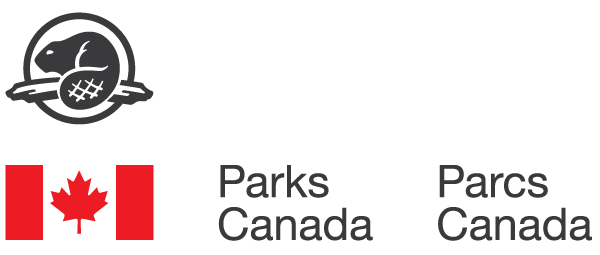





At 9 AM on a Tuesday morning, a large group of women and children stood excitedly outside of a Shopper’s Drug Mart on the Danforth Avenue. Some watched on as the bus driver carefully loaded baby strollers through the back of a bright yellow school bus. Curious passersby might have been given a clue to their destination from the myriad of brightly coloured jackets, hiking shoes, and day-packs that decorated the group - likely a result of MEC’s handy resource, the Guide to Day Hiking.
Excited chatter filled the aisles of the bus as the group journeyed up the Don Valley Parkway, leaving behind the concrete grey of downtown Toronto to experience the explosion of colour waiting for them at Rouge Park. Upon arrival, the group was greeted by Parks Canada staff that would lead them through two activities: How to Build a Camp, and a nature walk down one of the trails.
For most, it is their first experience visiting a large, provincial or national park in Canada - and for many, it was the first time visiting a park of that size in their life. People from at half a dozen different countires enthusiastically learned about the wildlife in the Rouge, what you need to build a camp, and how to read maps and trails.

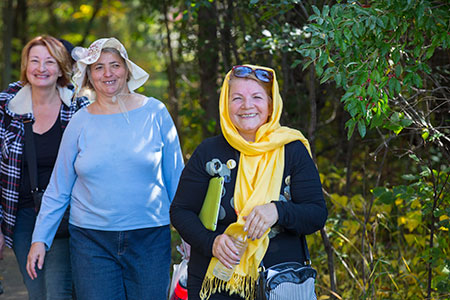
“When the seasons change, it’s the same for life, no?”
— Luisa from Colombia
Perpetual summer may sound good to some Canadians, but these two have fallen in love with what changing seasons may bring. Listen now.
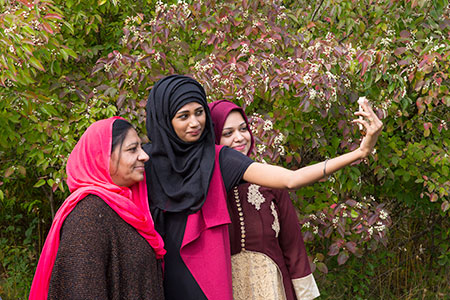
The sense of freedom and independence that being in the outdoors with friends and classmates was very strong for some women. Being able to talk, explore, and eat homemade food with friends offered a deep sense of connection and groundedness. Mehroz Ahmed tells us about her experiences navigating Karachi as a woman - listen now.
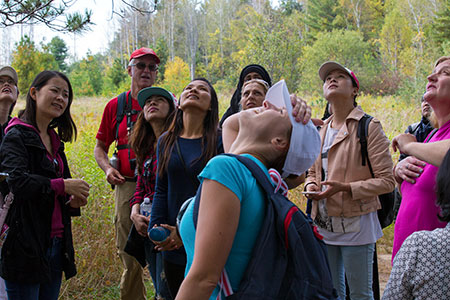
“Co-ni-fe-rous - it’s very difficult! But I learned it because we saw the trees, and the difference.”
Engaging our senses helps strengthen learning and connection to the words. Svitlana emphasizes the value of experiential learning from her trip to Rouge Park. Listen now.
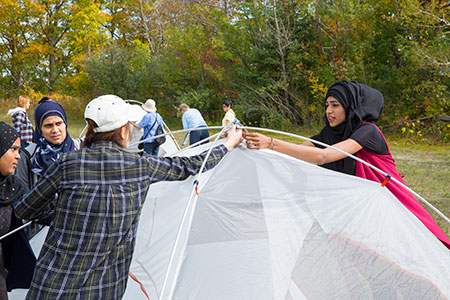
For many people who have not been camping before, it can feel intimidating. Having support and resources that teach these skills provides people with a sense of confidence to explore more places. Parks Canada staff shared information on how to build tents and fires, safety practices and emergency routines, and how to read maps and trails. Knowledge is power!
Some women who attended the Rouge Park outing came from countries where accessing nature is heavily regulated, or women are not able to navigate public life safely or autonomously. Others may come from places where they can not only access the outdoors safely and relatively easily, but also may have similar landscapes and climate. Such factors influence how comfortable people may feel in the outdoors.
As the ongoing dialogue around Truth and Reconciliation unfolds in Canada, Justine reflects on her role and relationship to the land being an immigrant settler. “The idea of the immigrant settler is so new to me - I never considered how my family and I have benefited from these lands,” she muses. “I don’t want to discount the struggle and emotion of the immigrant experience - but we have to think about it.”
Her deep reflection around this topic also sparked an interest in interrogating the history of her own country, and learning about the Indigenous Filipino peoples that continue to live there. “Learning about this is so special to me,” she says, voice catching with emotion. Truly, being in nature leads to discovery - and we never know where it will lead us next.
Sherry grew up in a village in China. As a newcomer to Canada, she knows how valuable first-hand experience is to developing the confidence to navigate the city on her own. She emphasizes how outings like the Parkbus trip to Rouge Park help her feel more independent, especially as she is able to go without depending on her husband to go.
“Before, in my life, camping was only in the dictionary.”
The outing she went on through her classes at Newcomer Women’s Services was the first time Sherry ever visited the outdoors. Sherry was surprised to learn that the Woolly Bear Caterpillars she feared in China were important to the environment. This simple encounter with a fuzzy little creature helped bridge experiences between classmates.
“We learn something we don’t learn in the school if we are outside. [...] My classmates too, we share each experience to each other. Maybe in their family, and their country - maybe in my family, or my country - for example I say woolly caterpillar, and they say ‘Ah! I saw this one! My country has the same ones!’ If we don’t do the trip, we don’t know.”
In a beautiful moment of intergenerational learning, women huddled around youngsters who were excited to be exploring the outdoors in this new country.
Listen to Sherry’s story here:
It’s not just caterpillars that brought together diverse experiences. Shehnaz from India discusses how eating together with friends in an outdoors environment made her reminisce about her farm back home.